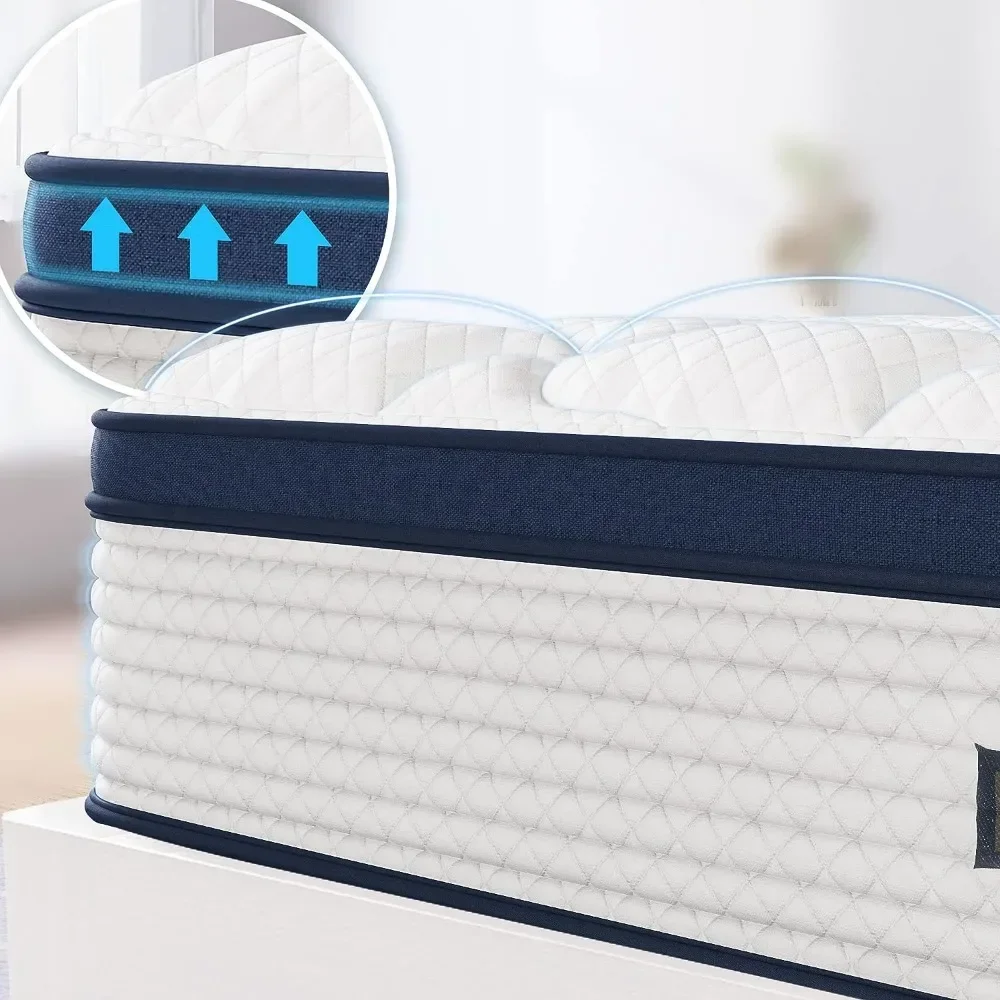Introduction to Mattress Firmness
Choosing the right mattress firmness is crucial for ensuring a good night’s sleep and maintaining spinal health. Soft mattresses, often marketed for their plush comfort, raise questions about their impact on back health. While they appeal to those who prefer a cushiony feel, concerns arise regarding adequate support for the spine and potential exacerbation of back problems.
Understanding Mattress Firmness Levels
Mattresses are typically categorized into different firmness levels ranging from soft to firm. The firmness scale helps consumers understand how much sinkage and support they can expect. Soft mattresses, usually rated between 3 to 5 on a scale of 10 (with 10 being the firmest), provide more contouring and less resistance to pressure points compared to firmer counterparts.
Pros of Sleeping on a Soft Mattress
- Pressure Relief: Soft mattresses conform closely to the body, which helps relieve pressure points such as hips and shoulders. This can be beneficial for people with joint pain or conditions like arthritis.
- Comfort for Side Sleepers: Side sleepers often find soft mattresses more comfortable as they allow the hips and shoulders to sink in, maintaining better spinal alignment.
- Motion Isolation: Soft mattresses tend to absorb motion better than firmer ones, making them ideal for couples or light sleepers who are easily disturbed.
- Initial Comfort: Many users find the initial plush feel of a soft mattress inviting and luxurious, which can improve sleep quality and overall satisfaction.

Cons of Sleeping on a Soft Mattress
- Lack of Support: One of the primary concerns with soft mattresses is inadequate support for the spine, especially for back and stomach sleepers. This can lead to misalignment and potential back pain.
- Sagging Over Time: Soft mattresses may sag or develop indentations more quickly than firmer mattresses, reducing their lifespan and supportiveness over time.
- Heat Retention: Some soft mattresses, especially those made with memory foam, may retain heat more than firmer alternatives, potentially causing discomfort for hot sleepers.
- Difficulty Moving: The sinking feeling of a soft mattress can make it challenging for some individuals to move or get out of bed easily, which might be a concern for older adults or those with mobility issues.
Impact on Back Health and Spinal Alignment
The relationship between mattress firmness and back health is critical. Proper spinal alignment during sleep supports the natural curvature of the spine and helps prevent or alleviate back pain. While soft mattresses can initially feel comfortable, they may not provide adequate support to keep the spine in a neutral position, especially for back and stomach sleepers.
Who Should Consider a Soft Mattress?
- Side Sleepers: People who primarily sleep on their sides may benefit from the pressure-relieving properties of a soft mattress, as it allows for better contouring of the hips and shoulders.
- Lighter Individuals: Lighter individuals may find soft mattresses more comfortable as they may not sink in as deeply compared to heavier individuals, maintaining better support.
- Those with Joint Pain: Individuals suffering from joint pain or conditions like arthritis may find relief with a softer mattress that cushions and alleviates pressure points.

Who Should Avoid Soft Mattresses?
- Back and Stomach Sleepers: These sleepers typically need firmer support to maintain proper spinal alignment. A soft mattress may cause the hips to sink too deeply, leading to back discomfort over time.
- Heavier Individuals: Heavier individuals may find that soft mattresses do not provide adequate support, causing excessive sinking and potential discomfort.
- People with Chronic Back Issues: Those with chronic back pain or spinal conditions should consult with a healthcare professional before opting for a soft mattress, as it may exacerbate existing issues.
Tips for Choosing and Using a Soft Mattress
- Trial Period: Take advantage of any trial periods offered by mattress retailers to ensure the soft mattress meets your comfort and support needs over time.
- Mattress Toppers: Consider using a mattress topper to adjust the firmness level of your soft mattress slightly if you find it too plush or lacking in support.
- Regular Rotation: Rotate your mattress regularly (every few months) to promote even wear and prevent excessive sagging or indentations.
- Supportive Bedding: Use pillows and bedding that complement the soft mattress to help maintain proper spinal alignment and support while sleeping.
Exploring the Impact of Soft Mattresses on Back Health
Importance of Spinal Alignment
Maintaining proper spinal alignment during sleep is crucial for preventing back pain and promoting overall spinal health. A mattress that is too soft may not adequately support the natural curvature of the spine, leading to misalignment over time. This can result in discomfort and potentially exacerbate existing back issues.
Suitability for Different Sleep Positions
- Side Sleepers: Soft mattresses are generally more suitable for side sleepers because they allow the hips and shoulders to sink in, which helps maintain spinal alignment. This position typically benefits from the pressure-relieving properties of a softer surface.
- Back Sleepers: Back sleepers require a mattress that supports the lower back and prevents it from sinking too deeply. A mattress that is too soft may cause the hips to sink, leading to strain on the lumbar region and potential discomfort over time.
- Stomach Sleepers: Stomach sleepers need a firmer mattress to prevent the hips from sinking too far into the mattress, which can strain the lower back and cause discomfort. Soft mattresses may not provide adequate support in this sleeping position.
Potential Drawbacks
- Lack of Support: If not properly designed, soft mattresses may lack the necessary support for proper spinal alignment, leading to back pain or discomfort over time.
- Durability: Soft mattresses, particularly those made from low-quality materials, may sag or lose support quicker than firmer alternatives.
- Heat Retention: Some soft mattresses, especially those with memory foam, may retain body heat, potentially causing discomfort for hot sleepers.
Choosing the Right Soft Mattress
- Material: Look for high-quality materials like latex or high-density memory foam that offer both comfort and support. Consider mattress reviews and trials to assess comfort and durability.
- Thickness: Thicker mattresses often provide more cushioning and support. Ensure the mattress thickness is suitable for your body weight and sleeping preferences.
- Trial Periods: Many mattress brands offer trial periods. Take advantage of these to test the mattress at home and ensure it meets your comfort and support needs.
Considerations for Individuals with Back Pain
For individuals with chronic back pain or spinal issues, choosing the right mattress is especially critical. While soft mattresses can offer initial comfort, they may not provide the necessary support to alleviate or prevent back pain. Consulting with a healthcare professional can provide personalized recommendations based on specific health conditions and sleep preferences.

Durability and Long-Term Comfort
Soft mattresses, particularly those made with memory foam or latex, may be prone to sagging over time, especially with regular use. This can reduce their effectiveness in providing support and comfort, leading to a decrease in overall sleep quality.
Cooling Features and Breathability
Many modern soft mattresses incorporate cooling technologies such as gel-infused foams or breathable covers to regulate temperature and prevent overheating during sleep. This can be advantageous for individuals who tend to sleep hot and are considering a softer mattress.
Conclusion
Choosing between a soft mattress and a firmer one depends largely on individual preferences, sleep positions, and specific health considerations. While soft mattresses offer initial comfort and pressure relief, they may not provide adequate support for everyone, particularly those needing firmer support for spinal alignment. Understanding the pros and cons outlined in this article can help you make an informed decision that promotes both comfort and back health for restful nights and energized mornings. Always prioritize your personal comfort and consult with healthcare professionals if you have specific concerns about your back health and mattress choice.









